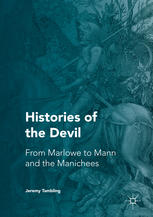

Most ebook files are in PDF format, so you can easily read them using various software such as Foxit Reader or directly on the Google Chrome browser.
Some ebook files are released by publishers in other formats such as .awz, .mobi, .epub, .fb2, etc. You may need to install specific software to read these formats on mobile/PC, such as Calibre.
Please read the tutorial at this link: https://ebookbell.com/faq
We offer FREE conversion to the popular formats you request; however, this may take some time. Therefore, right after payment, please email us, and we will try to provide the service as quickly as possible.
For some exceptional file formats or broken links (if any), please refrain from opening any disputes. Instead, email us first, and we will try to assist within a maximum of 6 hours.
EbookBell Team

4.7
76 reviewsThis book is about representations of the devil in English and European literature. Tracing the fascination in literature, philosophy, and theology with the irreducible presence of what may be called evil, or comedy, or the carnivalesque, this book surveys the parts played by the devil in the texts derived from the Faustus legend, looks at Marlowe and Shakespeare, Rabelais, Milton, Blake, Hoffmann, Baudelaire, Goethe, Dostoevsky, Bulgakov, and Mann, historically, speculatively, and from the standpoint of critical theory. It asks: Is there a single meaning to be assigned to the idea of the diabolical? What value lies in thinking diabolically? Is it still the definition of a good poet to be of the devil's party, as Blake argued?